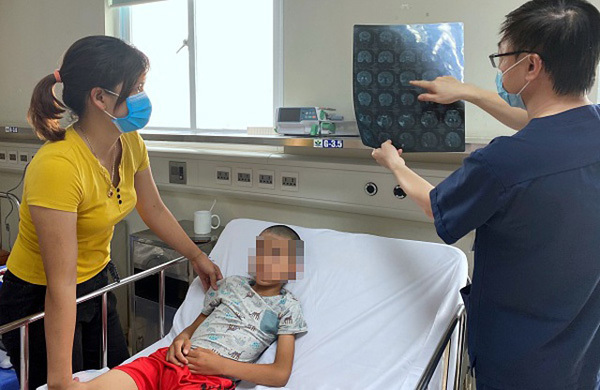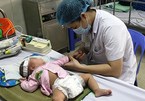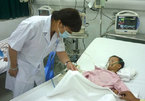 |
| A ten-year-old kid from Hai Duong Province being treated with Japanese encephalitis at the National Pediatric Hospital in Hanoi. — Photo benhviennhitrunguong.org.vn |
Of the figure, two suffered Japanese encephalitis and the remaining were caused by herpes simplex virus and other viruses, said Dr Nguyen Van Lam, director of the hospital's Centre for Clinical Medicine of Tropical Diseases for Children.
Parents need to be vigilant and should take preventive measures against the disease as the summer comes, the peak season of Japanese encephalitis between May and July.
A mother of a 10-year-old from the northern province of Hai Duong hospitalised for the disease said that a few days ago, her child had a fever, headache and vomiting.
Thinking that the kid had flu, she self-medicated and her son got better.
However, three days later, the child had a high fever and seizures.
His family rushed him to the provincial Children Hospital for emergency treatment and then he was transferred to Hanoi-based National Paediatrics Hospital where doctors diagnosed him with Japanese encephalitis.
In the first two days, the condition of the child was still worse and he was placed on a ventilator, said Dr Dao Huu Nam, head of the Department of Active Treatment.
After 10 days of treatment, the child was able to leave the hospital for rehabilitation because his left side was still weak.
"In recent years, the disease has been recorded in some older children and they were in severe condition. Worse, most of them were not vaccinated against the disease," said Dr Lam.
He said the vaccination should be done at least three times, first when the child was a year old, the second one to two weeks after the first one and the last a year after the second shot. After that, the vaccination should be done every three to five years until the child is 15 years old.
Japanese encephalitis is caused by the mosquito-borne Japanese encephalitis virus that can spread the disease throughout the year, but most frequently in summer.
The disease is more common among children under 15. Pigs and birds are reservoirs of the virus.
High fever, headache and nausea are early symptoms of the disease.
Severe disease can result in a high fever, headache, neck stiffness, disorientation, coma, seizures, spastic paralysis and even death.
The disease primarily affects children; without timely treatment, children may be at risk of death or suffer serious neurological complications, Lam said.
The mortality rate is high, hitting 30 per cent if not treated in time.
To prevent Japanese encephalitis, parents should take their children to hospitals for vaccinations, doctors recommend. VNS

Japanese encephalitis enters its peak season in Vietnam
In Vietnam, year-round Japanese encephalitis is usually prevalent in summer season and peaks between June and July.

Hanoi reports first Japanese encephalitis case of the year
A four-year-old boy was hospitalised last week in Hanoi due to Japanese encephalitis (JE). He was suffering from a high fever and seizures.
 The National Paediatrics Hospital has reported it has received nearly 100 cases of children with encephalitis since the beginning of the year.
The National Paediatrics Hospital has reported it has received nearly 100 cases of children with encephalitis since the beginning of the year.